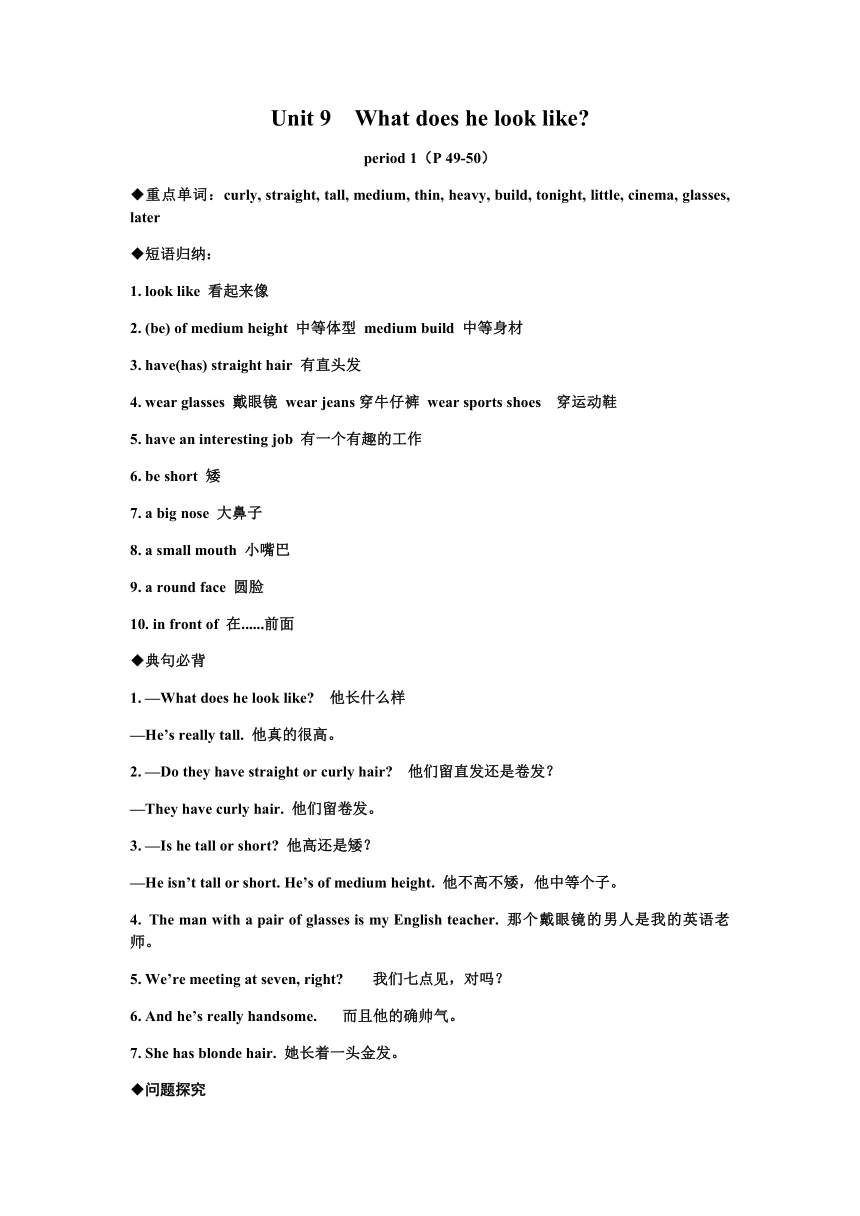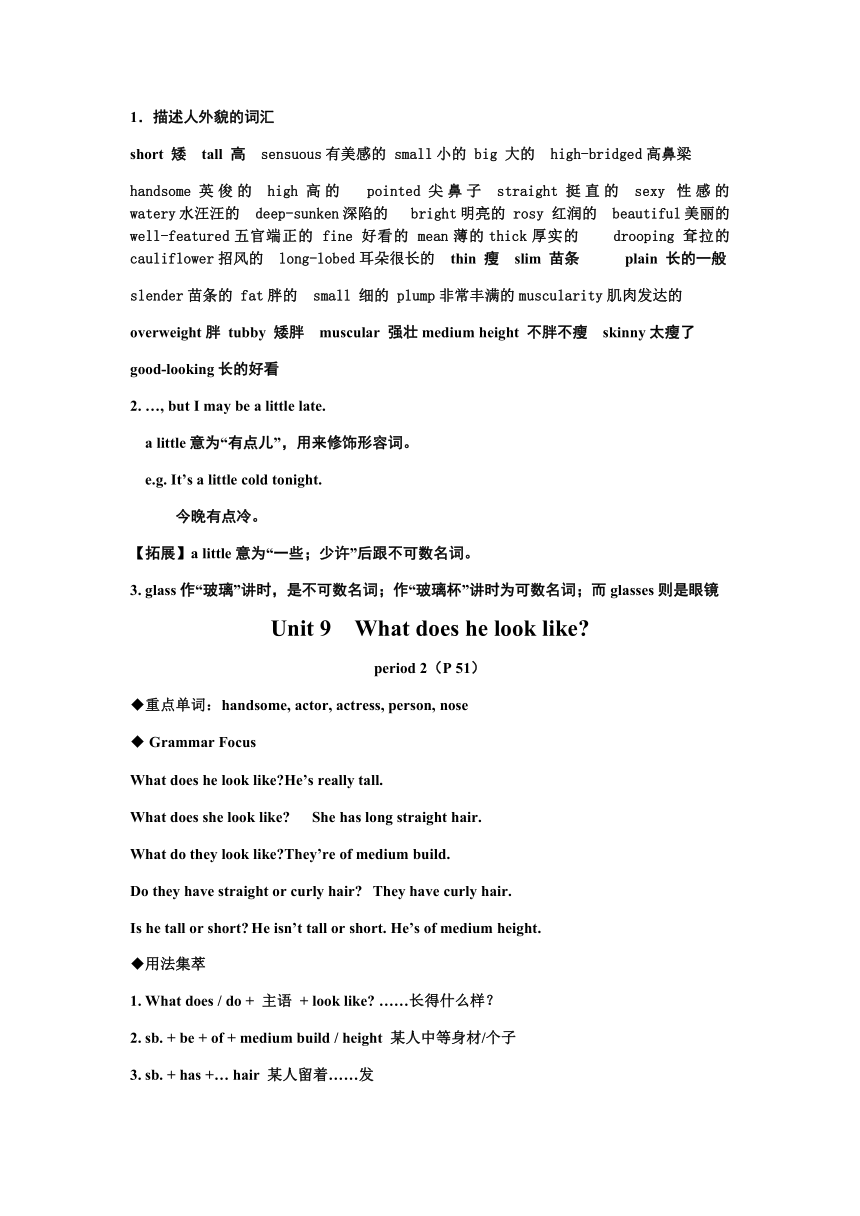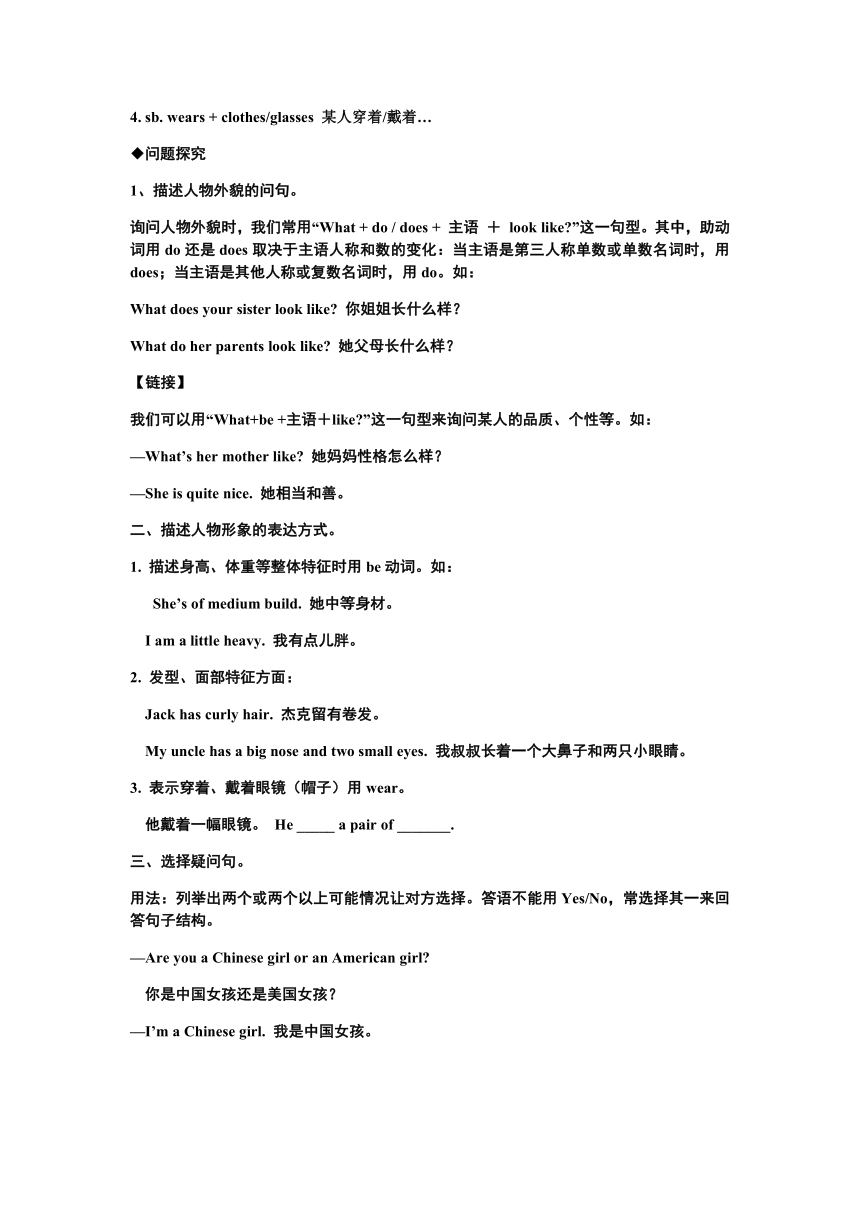Unit 9 What does he look like 暑假复习学案
文档属性
| 名称 | Unit 9 What does he look like 暑假复习学案 |  | |
| 格式 | docx | ||
| 文件大小 | 122.8KB | ||
| 资源类型 | 教案 | ||
| 版本资源 | 人教新目标(Go for it)版 | ||
| 科目 | 英语 | ||
| 更新时间 | 2023-08-08 23:03:24 | ||
图片预览



文档简介
Unit 9 What does he look like
period 1(P 49-50)
◆重点单词:curly, straight, tall, medium, thin, heavy, build, tonight, little, cinema, glasses, later
◆短语归纳:
1. look like 看起来像
2. (be) of medium height 中等体型 medium build 中等身材
3. have(has) straight hair 有直头发
4. wear glasses 戴眼镜 wear jeans穿牛仔裤 wear sports shoes 穿运动鞋
5. have an interesting job 有一个有趣的工作
6. be short 矮
7. a big nose 大鼻子
8. a small mouth 小嘴巴
9. a round face 圆脸
10. in front of 在......前面
◆典句必背
1. —What does he look like 他长什么样
—He’s really tall. 他真的很高。
2. —Do they have straight or curly hair 他们留直发还是卷发?
—They have curly hair. 他们留卷发。
3. —Is he tall or short 他高还是矮?
—He isn’t tall or short. He’s of medium height. 他不高不矮,他中等个子。
The man with a pair of glasses is my English teacher. 那个戴眼镜的男人是我的英语老师。
5. We’re meeting at seven, right 我们七点见,对吗?
6. And he’s really handsome. 而且他的确帅气。
7. She has blonde hair. 她长着一头金发。
◆问题探究
1.描述人外貌的词汇
short 矮 tall 高 sensuous有美感的 small小的 big 大的 high-bridged高鼻梁
handsome英俊的 high高的 pointed尖鼻子 straight挺直的 sexy 性感的 watery水汪汪的 deep-sunken深陷的 bright明亮的 rosy 红润的 beautiful美丽的 well-featured五官端正的 fine 好看的 mean薄的thick厚实的 drooping 耷拉的cauliflower招风的 long-lobed耳朵很长的 thin 瘦 slim 苗条 plain 长的一般
slender苗条的 fat胖的 small 细的 plump非常丰满的muscularity肌肉发达的
overweight胖 tubby 矮胖 muscular 强壮medium height 不胖不瘦 skinny太瘦了
good-looking长的好看
2. …, but I may be a little late.
a little意为“有点儿”,用来修饰形容词。
e.g. It’s a little cold tonight.
今晚有点冷。
【拓展】a little意为“一些;少许”后跟不可数名词。
3. glass作“玻璃”讲时,是不可数名词;作“玻璃杯”讲时为可数名词;而glasses则是眼镜
Unit 9 What does he look like
period 2(P 51)
◆重点单词:handsome, actor, actress, person, nose
◆ Grammar Focus
What does he look like He’s really tall.
What does she look like She has long straight hair.
What do they look like They’re of medium build.
Do they have straight or curly hair They have curly hair.
Is he tall or short He isn’t tall or short. He’s of medium height.
◆用法集萃
1. What does / do + 主语 + look like ……长得什么样?
2. sb. + be + of + medium build / height 某人中等身材/个子
3. sb. + has +… hair 某人留着……发
4. sb. wears + clothes/glasses 某人穿着/戴着…
◆问题探究
1、描述人物外貌的问句。
询问人物外貌时,我们常用“What + do / does + 主语 + look like ”这一句型。其中,助动词用do还是does取决于主语人称和数的变化:当主语是第三人称单数或单数名词时,用does;当主语是其他人称或复数名词时,用do。如:
What does your sister look like 你姐姐长什么样?
What do her parents look like 她父母长什么样?
【链接】
我们可以用“What+be +主语+like ”这一句型来询问某人的品质、个性等。如:
—What’s her mother like 她妈妈性格怎么样?
—She is quite nice. 她相当和善。
二、描述人物形象的表达方式。
1. 描述身高、体重等整体特征时用be动词。如:
She’s of medium build. 她中等身材。
I am a little heavy. 我有点儿胖。
2. 发型、面部特征方面:
Jack has curly hair. 杰克留有卷发。
My uncle has a big nose and two small eyes. 我叔叔长着一个大鼻子和两只小眼睛。
3. 表示穿着、戴着眼镜(帽子)用wear。
他戴着一幅眼镜。 He _____ a pair of _______.
三、选择疑问句。
用法:列举出两个或两个以上可能情况让对方选择。答语不能用Yes/No,常选择其一来回答句子结构。
—Are you a Chinese girl or an American girl
你是中国女孩还是美国女孩?
—I’m a Chinese girl. 我是中国女孩。
Unit 9 What does he look like
period 3(P 52)
◆重点单词:blonde, mouth, round, face, eye,
◆短语拓展:
1. on television=on TV在电视上
2. describe the same person 描述同样的人
3. in the end 最后
4. first of all 首先;第一
5. wear jeans 穿牛仔裤
6. wear sports shoes 穿运动鞋
7. have(has) straight hair 有直头发
8. be short 矮
9. a big nose 大鼻子
10. a small mouth 小嘴巴
11. a round face 圆脸
◆典句必背:
1. And he’s really handsome. 而且他的确帅气。
2. She has blonde hair. 她长着一头金发。
3. Many people don’t always see things the same way so they may describe the same person differently.人们并非总是以同样的方式看待事物,所以他们会将同一个人描述得不一样。
4. Also, they don’t always remember well.而且,他们并不总记得牢靠。
◆问题探究
1. singer 唱歌家 artist艺术家
构词法:动词 + er (人物)名词
名词 + ist (人物)名词
例如:teach (教) teacher 老师
play (打) player(运动员;播放器)
piano (钢琴) pianist (钢琴家)
violin (小提琴) violinist (小提琴家)
2. … and the police put it in newspaper and on television to find him.
police意为“警察,警方”,与people用法类似,为集合名词,例如:
The police were called. 有人报警。
Several police were injured during the rioting.
数名警察在暴动中负伤。
在表述“一名警察”时,要用a police officer或a policeman/ a policewoman。
在英语中,在报纸上用介词in, 不用on。在电视里用介词on, 不用in。
3. He wants to draw a good picture of each criminal…
each强调“个别”,可单独使用,也可修饰单数名词;
而every修饰单数名词,强调“整体”;相当于汉语中的“每个都”。例如:
Each boy has a kite.每个男孩都有一只风筝。
Every student in the class likes English. 班里的每个学生都喜欢英语。
Unit 9 What does he look like
period 4(P 53)
◆重点单词:singer, artist, crime, criminal, put, each, way, describe, differently, another, end, real
◆短语归纳:
the same way 相同的方法;同样的路子;同样的方式
the same person 同样的人;同一个人
2. in the end 最后
3. first of all 首先;第一
4. the real criminal真正的罪犯
5. the picture of the criminal 罪犯的画像
◆典句必背:
Many people don’t always see things the same way so they may describe the same person differently.人们并非总是以同样的方式看待事物,所以他们会将同一个人描述得不一样。
Also, they don’t always remember well.
He wants to draw a good picture of each criminal.
◆问题探究
1. Many people don’t always see things the same way so they may describe the same person differently.
1) same和different是一对反义词,前者表示“相同的,同样的”,后者表示“不同的;有区别的。”
same作为形容词时往往用在名词前,且之前往往有定冠词the。例如:
the same way 相同的方法;同样的路子;同样的方式
the same person同样的人;同一个人
2) differently是different的副词形式,在句中修饰动词,表示“不同地;有区别地”。
3) people和person
people表示“人,人们”,为复数名词;person为单个的人,有复数形式。
2. Another woman says…
another adj. 意为“另一”
e.g. This sweater is too small. Please give me another big one.这件毛衣太小了,请给我另一件大的。
另外,another还可作代词,意为“另一个”
e.g. I don’t like this room. Let’s ask for another. 我不喜欢这个房 间,我们要另一个吧。
Also, they don’t always remember well.
当also用于句首时,其后往往有逗号与 句子其他部分隔开。这时,also用于修饰整个句子,相当于汉语的“同时; 还;而且
e.g. Mr. Li’s class is interesting. Also, he makes it easy to understand.李老师的课很有趣,而且非常好理解。
also也常表示“也”,往往位于be动词后,行为动词前。
e.g. My father can speak English. He can also speak French. 我爸爸会说英语,也会讲法语。
4.real adj. 意为“真正的;真实的”
【拓展】really adv. 意为“真正地”
看! 那个女演员真漂亮Look! That actress is really beautiful.
Unit 9 What does he look like
period 5(P 54)
◆话题写作
1. Lost
Kate, a twelve –year-old girl, is lost in the street.She is of medium height with short hair. She has a round face and small eyes. She wears a pair of glasses. She wears a white shirt, a pair of blue jeans and a pair of black sports shoes.If anyone knows her, please call Mr. Green at 26458132. Thanks a lot.
2.
Sally is my friend. She is a singer. She sings very well. Now she has a new look. She doesn’t have long straight hair. She has short curly hair. And now she often wears glasses. She doesn’t wear her T-shirt. She wears a jacket and blue trousers. “It’s great!” she says. “When I take a walk with my dog on the street, nobody (没人) knows me.”
◆单元小结
◆教学反思
period 1(P 49-50)
◆重点单词:curly, straight, tall, medium, thin, heavy, build, tonight, little, cinema, glasses, later
◆短语归纳:
1. look like 看起来像
2. (be) of medium height 中等体型 medium build 中等身材
3. have(has) straight hair 有直头发
4. wear glasses 戴眼镜 wear jeans穿牛仔裤 wear sports shoes 穿运动鞋
5. have an interesting job 有一个有趣的工作
6. be short 矮
7. a big nose 大鼻子
8. a small mouth 小嘴巴
9. a round face 圆脸
10. in front of 在......前面
◆典句必背
1. —What does he look like 他长什么样
—He’s really tall. 他真的很高。
2. —Do they have straight or curly hair 他们留直发还是卷发?
—They have curly hair. 他们留卷发。
3. —Is he tall or short 他高还是矮?
—He isn’t tall or short. He’s of medium height. 他不高不矮,他中等个子。
The man with a pair of glasses is my English teacher. 那个戴眼镜的男人是我的英语老师。
5. We’re meeting at seven, right 我们七点见,对吗?
6. And he’s really handsome. 而且他的确帅气。
7. She has blonde hair. 她长着一头金发。
◆问题探究
1.描述人外貌的词汇
short 矮 tall 高 sensuous有美感的 small小的 big 大的 high-bridged高鼻梁
handsome英俊的 high高的 pointed尖鼻子 straight挺直的 sexy 性感的 watery水汪汪的 deep-sunken深陷的 bright明亮的 rosy 红润的 beautiful美丽的 well-featured五官端正的 fine 好看的 mean薄的thick厚实的 drooping 耷拉的cauliflower招风的 long-lobed耳朵很长的 thin 瘦 slim 苗条 plain 长的一般
slender苗条的 fat胖的 small 细的 plump非常丰满的muscularity肌肉发达的
overweight胖 tubby 矮胖 muscular 强壮medium height 不胖不瘦 skinny太瘦了
good-looking长的好看
2. …, but I may be a little late.
a little意为“有点儿”,用来修饰形容词。
e.g. It’s a little cold tonight.
今晚有点冷。
【拓展】a little意为“一些;少许”后跟不可数名词。
3. glass作“玻璃”讲时,是不可数名词;作“玻璃杯”讲时为可数名词;而glasses则是眼镜
Unit 9 What does he look like
period 2(P 51)
◆重点单词:handsome, actor, actress, person, nose
◆ Grammar Focus
What does he look like He’s really tall.
What does she look like She has long straight hair.
What do they look like They’re of medium build.
Do they have straight or curly hair They have curly hair.
Is he tall or short He isn’t tall or short. He’s of medium height.
◆用法集萃
1. What does / do + 主语 + look like ……长得什么样?
2. sb. + be + of + medium build / height 某人中等身材/个子
3. sb. + has +… hair 某人留着……发
4. sb. wears + clothes/glasses 某人穿着/戴着…
◆问题探究
1、描述人物外貌的问句。
询问人物外貌时,我们常用“What + do / does + 主语 + look like ”这一句型。其中,助动词用do还是does取决于主语人称和数的变化:当主语是第三人称单数或单数名词时,用does;当主语是其他人称或复数名词时,用do。如:
What does your sister look like 你姐姐长什么样?
What do her parents look like 她父母长什么样?
【链接】
我们可以用“What+be +主语+like ”这一句型来询问某人的品质、个性等。如:
—What’s her mother like 她妈妈性格怎么样?
—She is quite nice. 她相当和善。
二、描述人物形象的表达方式。
1. 描述身高、体重等整体特征时用be动词。如:
She’s of medium build. 她中等身材。
I am a little heavy. 我有点儿胖。
2. 发型、面部特征方面:
Jack has curly hair. 杰克留有卷发。
My uncle has a big nose and two small eyes. 我叔叔长着一个大鼻子和两只小眼睛。
3. 表示穿着、戴着眼镜(帽子)用wear。
他戴着一幅眼镜。 He _____ a pair of _______.
三、选择疑问句。
用法:列举出两个或两个以上可能情况让对方选择。答语不能用Yes/No,常选择其一来回答句子结构。
—Are you a Chinese girl or an American girl
你是中国女孩还是美国女孩?
—I’m a Chinese girl. 我是中国女孩。
Unit 9 What does he look like
period 3(P 52)
◆重点单词:blonde, mouth, round, face, eye,
◆短语拓展:
1. on television=on TV在电视上
2. describe the same person 描述同样的人
3. in the end 最后
4. first of all 首先;第一
5. wear jeans 穿牛仔裤
6. wear sports shoes 穿运动鞋
7. have(has) straight hair 有直头发
8. be short 矮
9. a big nose 大鼻子
10. a small mouth 小嘴巴
11. a round face 圆脸
◆典句必背:
1. And he’s really handsome. 而且他的确帅气。
2. She has blonde hair. 她长着一头金发。
3. Many people don’t always see things the same way so they may describe the same person differently.人们并非总是以同样的方式看待事物,所以他们会将同一个人描述得不一样。
4. Also, they don’t always remember well.而且,他们并不总记得牢靠。
◆问题探究
1. singer 唱歌家 artist艺术家
构词法:动词 + er (人物)名词
名词 + ist (人物)名词
例如:teach (教) teacher 老师
play (打) player(运动员;播放器)
piano (钢琴) pianist (钢琴家)
violin (小提琴) violinist (小提琴家)
2. … and the police put it in newspaper and on television to find him.
police意为“警察,警方”,与people用法类似,为集合名词,例如:
The police were called. 有人报警。
Several police were injured during the rioting.
数名警察在暴动中负伤。
在表述“一名警察”时,要用a police officer或a policeman/ a policewoman。
在英语中,在报纸上用介词in, 不用on。在电视里用介词on, 不用in。
3. He wants to draw a good picture of each criminal…
each强调“个别”,可单独使用,也可修饰单数名词;
而every修饰单数名词,强调“整体”;相当于汉语中的“每个都”。例如:
Each boy has a kite.每个男孩都有一只风筝。
Every student in the class likes English. 班里的每个学生都喜欢英语。
Unit 9 What does he look like
period 4(P 53)
◆重点单词:singer, artist, crime, criminal, put, each, way, describe, differently, another, end, real
◆短语归纳:
the same way 相同的方法;同样的路子;同样的方式
the same person 同样的人;同一个人
2. in the end 最后
3. first of all 首先;第一
4. the real criminal真正的罪犯
5. the picture of the criminal 罪犯的画像
◆典句必背:
Many people don’t always see things the same way so they may describe the same person differently.人们并非总是以同样的方式看待事物,所以他们会将同一个人描述得不一样。
Also, they don’t always remember well.
He wants to draw a good picture of each criminal.
◆问题探究
1. Many people don’t always see things the same way so they may describe the same person differently.
1) same和different是一对反义词,前者表示“相同的,同样的”,后者表示“不同的;有区别的。”
same作为形容词时往往用在名词前,且之前往往有定冠词the。例如:
the same way 相同的方法;同样的路子;同样的方式
the same person同样的人;同一个人
2) differently是different的副词形式,在句中修饰动词,表示“不同地;有区别地”。
3) people和person
people表示“人,人们”,为复数名词;person为单个的人,有复数形式。
2. Another woman says…
another adj. 意为“另一”
e.g. This sweater is too small. Please give me another big one.这件毛衣太小了,请给我另一件大的。
另外,another还可作代词,意为“另一个”
e.g. I don’t like this room. Let’s ask for another. 我不喜欢这个房 间,我们要另一个吧。
Also, they don’t always remember well.
当also用于句首时,其后往往有逗号与 句子其他部分隔开。这时,also用于修饰整个句子,相当于汉语的“同时; 还;而且
e.g. Mr. Li’s class is interesting. Also, he makes it easy to understand.李老师的课很有趣,而且非常好理解。
also也常表示“也”,往往位于be动词后,行为动词前。
e.g. My father can speak English. He can also speak French. 我爸爸会说英语,也会讲法语。
4.real adj. 意为“真正的;真实的”
【拓展】really adv. 意为“真正地”
看! 那个女演员真漂亮Look! That actress is really beautiful.
Unit 9 What does he look like
period 5(P 54)
◆话题写作
1. Lost
Kate, a twelve –year-old girl, is lost in the street.She is of medium height with short hair. She has a round face and small eyes. She wears a pair of glasses. She wears a white shirt, a pair of blue jeans and a pair of black sports shoes.If anyone knows her, please call Mr. Green at 26458132. Thanks a lot.
2.
Sally is my friend. She is a singer. She sings very well. Now she has a new look. She doesn’t have long straight hair. She has short curly hair. And now she often wears glasses. She doesn’t wear her T-shirt. She wears a jacket and blue trousers. “It’s great!” she says. “When I take a walk with my dog on the street, nobody (没人) knows me.”
◆单元小结
◆教学反思
同课章节目录
